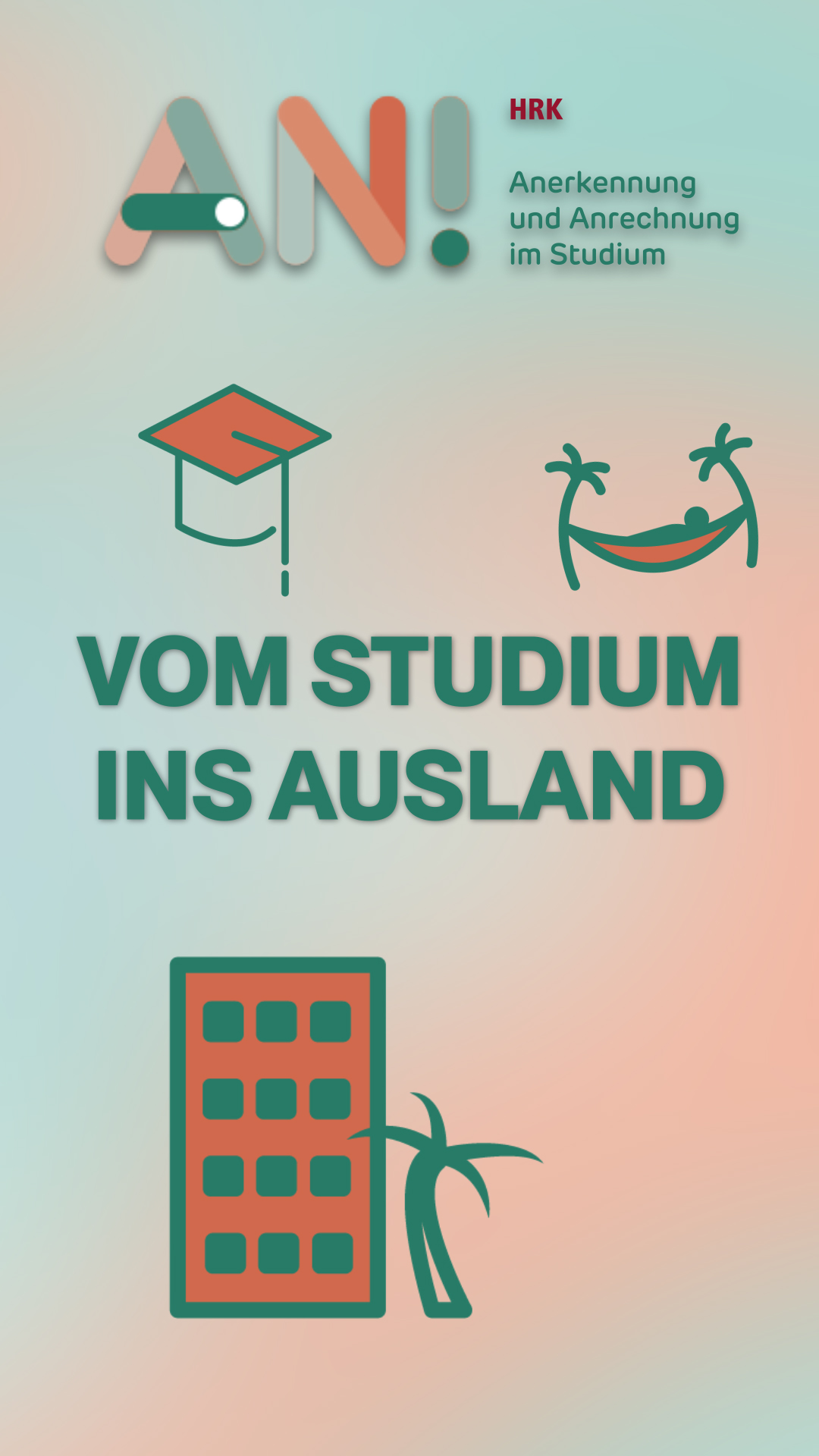- Have you already completed a study programme abroad and now you’d like to apply for a (postgraduate) degree in Germany? You can find more information on higher education access at hochschulstart.de (in German only). You can find out about the evaluation of foreign educational institutions and your educational qualifications at www.anabin.de (in German only), for example.
Here’s how it works: 3 steps to successful recognition of your achievements abroad
Step 1: How to find information in advance
- Although there are some (European) regulations, such as the Bologna Reform, about the recognition of your stay abroad for your studies in Germany after your return, difficulties can sometimes arise. The better you prepare for your stay abroad beforehand and the more you know about the time afterwards, the easier and smoother the recognition process will be. And once again you won’t lose any time! There are usually various people at your university who can provide you with information about the recognition of achievements from abroad, for example, Erasmus coordinators, the International Office or student advisory services. They will advise you at which university you can choose which study programme for a stay abroad. Also, they enquire with you about which achievements can be recognised afterwards and which documents you need to submit for this.
- Particularly if you are studying abroad with Erasmus+ your current home university and the host university will enter into a learning agreement with you in advance about your planned academic achievements. What is that exactly? The learning agreement specifies which modules you will study abroad and for which modules they will be recognised at your home university, including a statement of the ECTS credits. The learning agreement also contains the provisions governing the formal recognition of your learning outcomes abroad.
- You can find more detailed information about the learning agreement here: https://erasmus-plus.ec.europa.eu/resources-and-tools/mobility-and-learning-agreements/learning-agreement
- During your stay abroad, it may be necessary to adjust your learning agreement, e.g. if you change a study module or something else changes. It is best to stay in contact with your home university and your host university during your stay in order to clarify any questions and to find out about current changes. You should also collect all the evidence of the achievements you’ve attained. And don’t forget: Enjoy your time abroad!
Step 2: After the stay abroad
- As soon as possible after you have completed your time abroad, you should apply for recognition of your achievements. To do this, you need to submit all the relevant evidence that proves your achievements. Your contact person at your home university will provide you with more detailed information about these documents. As a rule, this includes the following documents: learning agreement, transcript of records and application. If you haven’t completed a learning agreement in advance, you’ll probably also need the module descriptions.
- By the way: You have an obligation to cooperate when submitting the application and during the subsequent assessment. You need to provide your university with all the information it needs to assess your application conclusively. Otherwise, the university has the right to stop processing your application prematurely and to refuse recognition due to a lack of information.
Step 3: How the decision is made
- Almost there! After you have submitted your application for recognition of your achievements, it will now be formally assessed by your home university. If you have not completed a learning agreement in advance, the content-related assessment will also occur now.
- Recognition is decided by comparing your competences acquired abroad with those required within your own study programme. The question here is whether there is a substantial difference between the competences acquired and those to be acquired. Along with the assessment of whether the institution or programme meets the standard of a (German) university, your learning outcomes achieved at another university or in another programme are the most important basis of examining a substantial difference.
- For the recognition decision, the “burden of proof” lies not with you, but with the university, which must demonstrate that your achievements cannot be recognised due to a substantial difference. This is referred to as a “reversal of the burden of proof”. But of course, the decision depends on whether your application and documents are complete and sound and whether there is a substantial difference or not.
- If your university identifies substantial differences in your achievements from abroad to those to be achieved here and provides evidence of these, your application may be rejected. You will then receive a rejection notice and have the option of lodging an objection (see options for objecting).
- Please be patient; the process can take up to three months. Important: As there are different grading systems in many countries, the grades are usually converted rather than being transferred one-to-one. For details on how your grades are converted, please contact the International Office at your university.
- The fact that achievements have been recognised is usually noted on your transcript of records.
Steps in the academic recognition process

 Checklist
Checklist
Step by step to successful recognition of your achievements abroad – summarised here in our compact checklist.

What’s next?
- In principle, these information apply to all German universities. However, there are differences between the federal states, and the universities themselves can determine how the procedures are structured, which can lead to discrepancies. So please contact your university that you would like your competences recognised by.
Want to know more?
- The German Academic Exchange Service (DAAD) provides information on its website about opportunities for studying abroad: https://www.daad.de/de/im-ausland-studieren-forschen-lehren/studieren-im-ausland/ (in German only)
- You will also find comprehensive information on studying abroad, internships or language courses on the website for the campaign “studieren weltweit – ERLEBE ES”: https://www.studieren-weltweit.de/ (in German only)
- Have you already completed a study programme abroad and now you’d like to apply for a (postgraduate) degree in Germany? You can find more information on higher education access at hochschulstart.de (in German only). You can find out about the evaluation of foreign educational institutions and your educational qualifications at www.anabin.de (in German only), for example.
- Are you going to Germany for a semester abroad? Then www.study-in-germany.de has helpful information for you all about your stay in Germany.
- The Central Office for Foreign Education also provides information on recognition in higher education if you have a foreign educational qualification: https://www.kmk.org/zab/central-office-for-foreign-education/general-information-about-recognition/academic-recognition.html.
Going abroad during your studies – all the important questions and answers
“Tell me again how it works?” Our FAQs provide concise, straightforward answers to important questions about academic recognition of your achievements and competences from abroad
The lexicon – everything you need to know about academic recognition and recognition of prior learning
Unfortunately, a few technical terms can’t be avoided. But don’t worry, our lexicon gives you simple and comprehensive definitions and explanations in alphabetical order – from accreditation and state higher education laws to options for objecting.



